Social media networks have become vital channels for Americans’ daily interactions. Users rely on these platforms to keep in touch with family and friends, gather information and share what is important to them. This report explores how parents – 75% of whom use social media – turn to social media for parenting-related information and social support.1
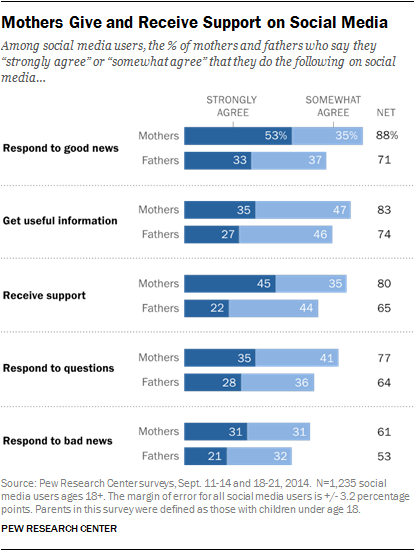
Mothers are heavily engaged on social media, both giving and receiving a high level of support via their networks.
Social media networks are host to a wide range of human experiences; they help connect people with one another in both good times and bad. Parents – in this study defined as those with children under 18 – are especially likely to try to respond to the good news others post, answer others’ questions or receive support via online networks. This is true for all kinds of personal matters they encounter – not just parenting posts. While somewhat less common, a majority of parents agree that they try to respond to bad news as well. Mothers are more likely than fathers to engage their networks across a variety of these outreach and support examples:
- 81% of parents who use social media try to respond to good news others share in their networks, including 45% of social-media-using parents who “strongly agree” that they do so. Some 53% of mothers say they “strongly agree,” compared with 33% of fathers who say that.
- 74% of parents who use social media get support from their friends there.2 Digging into the data, 35% of social-media-using parents “strongly agree” that they get support from friends on social media. Fully 45% of mothers who use social media “strongly agree” that they get support from friends on social media, compared with just 22% of fathers.
- 71% of all parents on social media try to respond if they know the answer to a question posed by someone in their online network. About a third (32%) of parents who use social media “strongly agree” that they try to respond to questions. Mothers and fathers are relatively similar in their responsiveness to questions on social media; 35% of mothers say they “strongly agree” that they make an effort to respond to questions, compared with 28% of fathers.
- 58% of parents who use social media try to respond when a friend or acquaintance shares bad news online. Mothers are particularly likely to “strongly agree” that they try to do this – 31% say so, compared with 21% of fathers.
Social media is broadly viewed as a source of useful information and as one parenting tool among a collection of options. Mothers use it as a parenting resource slightly more often than fathers.
While a large share of parents find value in social media as a general information resource, fewer say they come across useful parenting information while using social media. At the same time, one-in-four say they get support from their networks for parenting issues, and mothers who use social media are more than three times as likely as fathers to say they get support.
- 79% of parents who use social media agree that they get useful information via their networks. One-in-three (32%) “strongly agree” that they get useful information. Mothers are just as likely as fathers to “strongly agree” that they find useful information through their social media networks (35% vs. 27%).
-
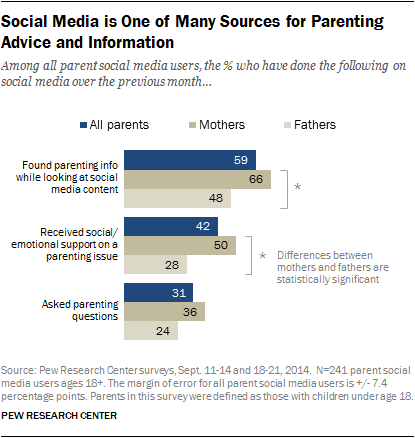
59% of social-media-using parents indicate that they have come across useful information specifically about parenting in the last 30 days while looking at other social media content. Mothers are particularly likely to encounter helpful parenting information – 66% have done so in the last 30 days, compared with 48% of fathers.
- 42% of these parents have received social or emotional support from their online networks about a parenting issue in the last 30 days. This includes 50% of mothers, compared with 28% of fathers on social media.
- 31% of parents who use social media have posed parenting questions to their online networks in the last 30 days. Mothers and fathers are equally likely to do so.
Few parents say they have felt uncomfortable when information about their children is shared by other family members or caregivers on social media.
Most parents have not felt uneasy about the content posted about their children by other family members or caregivers on social media.
- 12% of all parents of children under 18 say they have ever felt uncomfortable about something posted about their child on social media by a spouse, family member or friend. Fully 88% say they have not felt this way.
- 11% of all parents have ever asked for content about their child posted by a family member, caregiver or friend to be removed from social media.
Parents, like non-parents, use a variety of social media platforms.
This survey also took a broad look at the social media habits of parents. Among internet-using parents,3 social media use across a variety of platforms is common. Parents look a lot like non-parents in this regard, though there are differences between mothers and fathers:
-
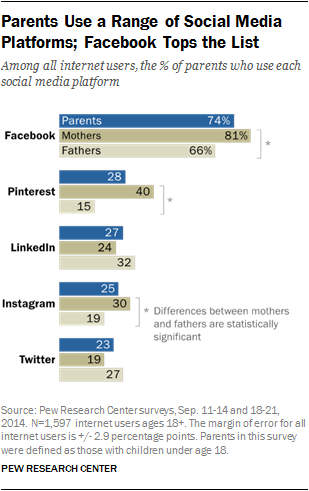
Three-quarters of online parents use Facebook, as do 70% of non-parents. Mothers are more likely to use Facebook than fathers, with 81% of moms and 66% of dads using the platform.
- 28% of online parents use Pinterest, including 40% of mothers and 15% of fathers.
- 27% of online parents use LinkedIn. Mothers and fathers are equally likely to use LinkedIn.
- 25% of online parents are Instagram users. Mothers are more likely than fathers to use the platform, 30% vs. 19%. Younger parents (those under 40) also are more likely to use Instagram than older parents, 33% vs. 18%.
- 23% of online parents use Twitter. Moms and dads are equally as likely to use Twitter.
Parents are particularly active on Facebook and LinkedIn, while non-parents use Instagram more frequently.
-
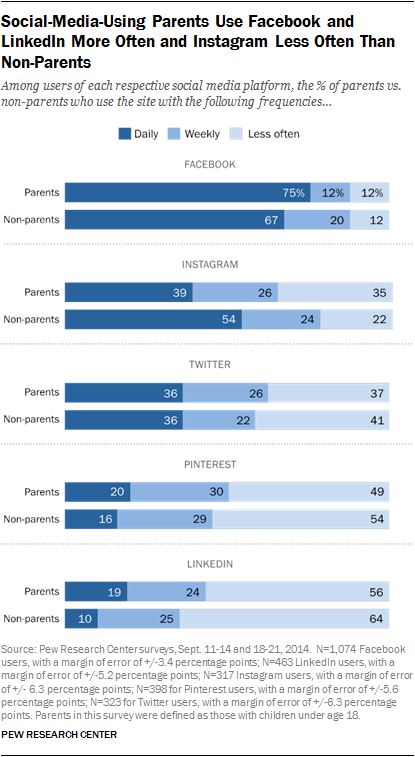
Parents on Facebook are especially avid users: 75% log on daily, including 51% who do so several times a day. This is a statistically significant difference when compared with non-parents, of whom 67% log on to Facebook daily, including 42% who do so several times a day. Mothers on Facebook are more likely to check the platform several times a day compared with fathers, 56% vs. 43%.
- Parents who use LinkedIn are more likely than non-parents to use the site daily (19% vs. 10% of non-parents).
- Parents who use Instagram are not as active as non-parent users. Some 54% of non-parents who use Instagram say they use the site daily, compared with 39% of parents.
- Among Twitter and Pinterest users, there are few statistically significant differences in how frequently parents and non-parents use the platforms.
How parents use Facebook
Given Facebook’s status as the most popular social media platform, this report takes a deeper look into the network composition and habits of parents on the network: Three-quarters (74%) of parents use Facebook.
Parents, particularly mothers, interact with their networks frequently.
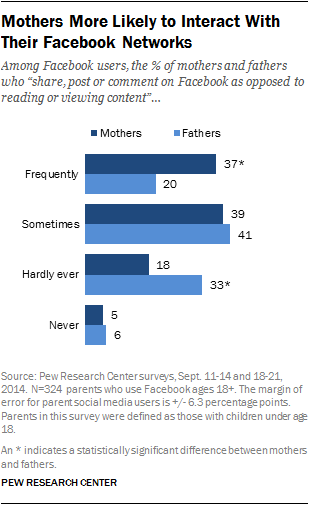
Fully 94% of Facebook-using parents share, post or comment on Facebook (as opposed to simply reading or viewing content), with 70% of parents doing so “frequently” or “sometimes.” This compares to a statistically similar 93% of non-parents who say they ever post content to the platform.
Overall, mothers and fathers who use Facebook are equally likely to say they ever share, post, or comment on Facebook. However, mothers are more likely to do this with greater frequency. Some 76% of mothers on Facebook say they do so “frequently” or “sometimes,” compared with 61% of fathers who say the same.
A typical parent has 150 Facebook friends. One-third of them are “actual” friends.
Among parents, the median number of Facebook friends is 150, while the typical non-parent Facebook user has a median of 200 friends. The largest group of parents on Facebook (42%) have between 0 and 100 Facebook friends on the network. Another 20% of parents say they have between 101 and 250 friends, while 23% have between 251 and 500 friends. Non-parents are more likely than parents to have very large Facebook networks — 16% of non-parent Facebook users have more than 500 Facebook friends, compared with 11% of parents.
Facebook networks are composed of a variety of people, not all of whom are necessarily considered close. Parents who use Facebook were asked how many of their friends on the platform they considered “actual friends.” A majority, 76%, said they considered between 0 and 100 of their Facebook friends “actual friends.” The typical parent reports a median of 50 “actual” Facebook friends, while the typical non-parent counts 40 of their Facebook friends as “actual” friends. As noted above, parents report having a median of 150 Facebook friends, and non-parents report having a median of 200 Facebook friends. Thus, a typical parent’s Facebook network is about one-third “actual” friends, while non-parents typically report that less than a quarter of their network is made up of actual friends.4
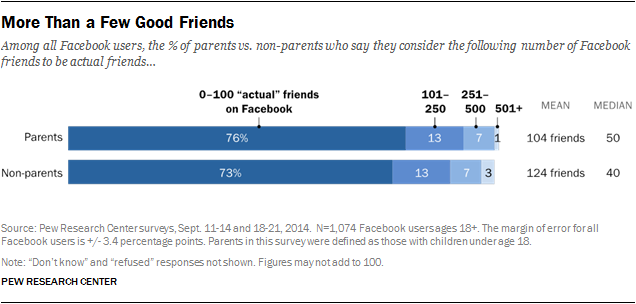
Family and friends make up the bulk of Facebook networks for parents and non-parents alike.
Family and friends, both new and old, are the most common types of connections in users’ Facebook networks.
- 93% of parents who use Facebook are friends with family members other than their parents or children on the network.
- 88% are Facebook friends with their current friends.
- 88% are connected with friends from the past, such as high school or college classmates.
- 60% are friends with their work colleagues.
- 53% are friends with their parents.
- 47% are friends with their children on Facebook.
- 41% are connected with people they have never met in person.
- 41% are friends with their neighbors.
Parents are more likely to be Facebook friends with their parents than non-parents, 53% vs. 40%. They also are more likely to be friends with their neighbors on the network, 41% vs. 34% of non-parents.
Age is a major factor in who makes up the bulk of parents’ Facebook networks. Some 93% of younger parents (those under age 40) who use Facebook are connected with friends from the past. This is significantly more than the 83% of older parents (those ages 40 and older) who say the same. Younger parents also are more likely to be Facebook friends with their own parents (71% vs. 35%).
Older parents, those ages 40 and above, are more likely to be friends with their children on Facebook. Some 65% said so, compared with 30% of younger parents. These findings likely reflect the fact that Facebook requires users to be ages 13 and older.5
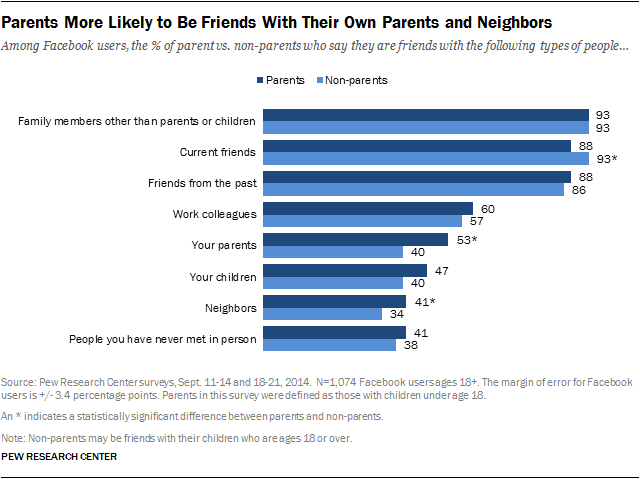
The data reported here were collected in two telephone surveys conducted by PSRAI and fielded from Sept. 11 to 14, 2014, and Sept. 18 to 21, 2014. The surveys interviewed a nationally representative sample of 2,003 American adults ages 18 and older. Telephone interviews were conducted by landline (1,002) and cell phone (1,001, including 594 without a landline phone). Interviews were conducted in English and Spanish by Princeton Data Source from Sept. 11 to 14, 2014, and Sept. 18 to 21, 2014. Statistical results are weighted to correct known demographic discrepancies. The margin of sampling error for the complete set of weighted data is ± 2.5 percentage points.




